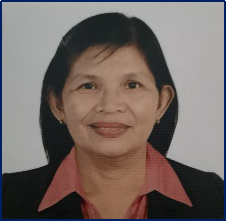I School Background
Ragay National Agricultural and Fisheries School (RNAFS), the largest technical-vocational school in the Bicol Region was established on June 19, 1971 by virtue of House Bill no. 96 (Republic Act 6315) with Congressman Ramon H. Felipe, Jr. as sponsor during the time of Principal Benjamin Arcilla in Brgy. Liboro, Ragay, Camarines Sur, when the railroad tracks, the trains and the skates were the major means of transportation. Nowadays, the Andaya Highway, public jeepneys, buses and tricycles as well as private cars help make the school more accessible.
The school has for its vision and mission those of the Department of Education (DepEd):
Vision: We dream of Filipinos who passionately love their country and whose value and competencies enable them to realize their full potential and contribute meaningfully to building the nation.
As a learner-centered public institution, the Department of Education continuously improves itself to better serve its stakeholders.
Mission: To protect and promote the right of every Filipino to quality, equitable, culture-based, and complete basic education where:
Students learn in a child-friendly, gender-sensitive, safe, and motivating environment.
Teachers facilitate learning and constantly nurture every learner.
Administrators and staff, as stewards of the institution, ensure an enabling and supportive environment for effective learning to happen.
Family, community, and other stakeholders are actively engaged and share responsibility for developing life-long learners.
Alongside its own: RNAFS is a technologically-equipped institution with highly-efficient teachers and collaborative stakeholders producing quality learners.
To provide quality education through:
Creation of industry-based environment exposing learners to actual work and life situations;
Enhancement of skills for teachers, and
Involvement of the various stakeholders in the formulation and implementation of school programs and projects.
Ana G. Palenzuela, hailing from Brgy. Godofredo Reyes Sr., Ragay, Camarines Sur is Secondary School Principal II. She draws inspiration from the leadership of the DepEd Camarines Sur mentors: Division Education Program Specialist for Technical-Vocational Education Atty. Salvador Pelingon, Public Schools District Supervisor Melecio A. Postrado, Assistant Schools Division Superintendent Susan S. Collano, Schools Division Superintendent Loida N. Nidea, and DepEd Bicol’s officials: Regional Education Program Specialist for Special Program for Technical-Vocational Education/ TVL/ TLE/EPP Christie L. Alvarez, and Regional Director Gilbert T. Sadsad.
Included are photos of RNAFS main gate and marker:

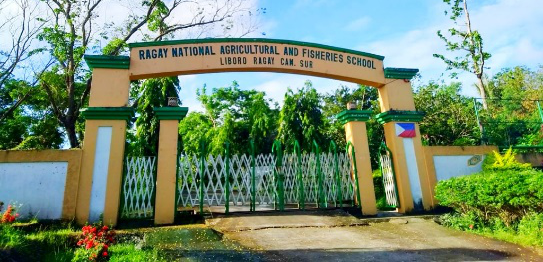
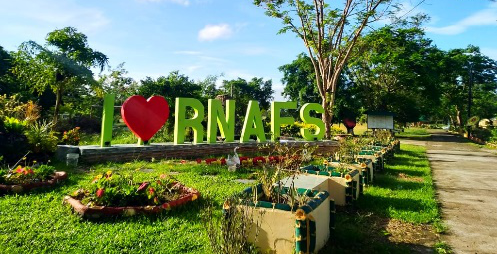
II School Demographic Information
There are four department heads: Ma. Helen M. Tangente for the SHS, Georgette R. Imperial for Arts and Trades, Annabelle B. Ramirez for Agri-Fishery, and Jose Edwin P. Ramirez for Related/Academic Subjects. There are 34 teachers in the Junior High School, eight are agri-fishery majors, with National Certificate II. There are 14 teachers in Senior High School and four are agri-fishery majors with National Certificate II.
This school year, there are 1,303 learners from Grade 7 to Grade 12. As a technical-vocational secondary school, RNAFS offers the Special Program for Technical-Vocational Education (SPTVE), the Science and Mathematics-Oriented Curriculum (SMOC) and the Alternative Learning System (ALS)-Balik Paaralan Out of School Adults (BPOSA) and Education and Skills Training (EST).
Teachers’qualifications include units in post-graduate studies, continuing attendance, participation and speakerships in writeshops for modules, lesson plans and reference materials, trainings, seminars, workshops and outreach events, as well as recognitions/awards received in the school, district, division, national and international levels. For details, please refer to the attached sheets with tables.
For offices dispersing services and functions RNAFS has the following: the administration building, registrar’s office, guidance office, the Science Laboratory, ICT Laboratory, the JHS and SHS Libraries, then Multipurpose Hall, and the Multipurpose Covered Court and the RNAFS Training and Development Center (RTDC). There are the Food Laboratory the fish hatchery, piggery and poultry that serve both as practicum sites and income-generating projects of the learners.
There is no particular scholarship program in the school because technically, all learners are scholars of the state because the school is government-funded.
Student admission/requirements include the most basic of documents such as birth certificate and report card of the previous grade. As a public school, RNAFS is mandated to accept all enrolees qualified to any grade level.
RNAFS establishes and maintains strong and healthy linkages and relationships with stakeholders and partners, both public and private. Close to its fences are the RNAFS Parents-Teachers Association (PTA), the RNAFS Alumni Association Inc. (RAAI), and the Ragay Sangguniang Bayan and Local Government Units as well as the Ragay Bureau of fire Protection (BFP). Available to assist with just one call are the following: Technical Education and Skills Development Authority (TESDA), Bureau of Fisheries and Aquatic Resources (BFAR) which leads to the school’s membership to Bicol Fisheries Research Development and Extension Network (BIFIRDEN), the Department of Agriculture (DA), the Department of Science and Technology, the Department of Labor and Employment, Department of Social Welfare and Development (DSWD), and Department of Labor and Employment (DoLE) which facilitates the school’s Special Program for Student Services (SPES).
The most notable academic achievements include those of students who were passers of the University of the Philippines College Admission Test (UPCAT), a number of them graduating from the UP with academic distinctions, 68 ALS-BPOSA Accreditation and Equivalency (A&E) test passers (since 2005). Also commendable were the SMOC learners’ wins in the 2012 Battle of the Wise (BOW) team events, and the campus journalists’ wins in the 2015 Students Today Road Users Tomorrow (STRUT) Campaign of the Land Transportation Office (LTO) for best editorial, best feature article, and best editorial cartoon. Further, there are the winnings in the district, division and regional levels of the Press Conference, Science and Youth for Environment in Schools organization (YES-O) Camps, and the Mathematics Teachers Association of the Philippines (MTAP) competitions,
Included here are some photos of available and functional facilities and practicum sites:
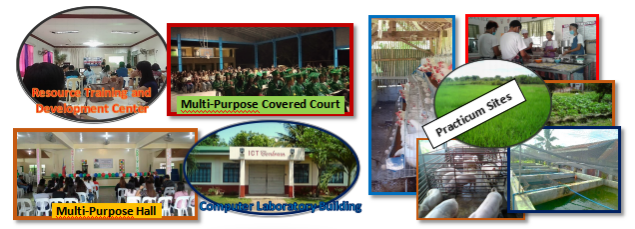
On the number of graduates getting employment, RNAFS data consider the four exits of the K to 12 Basic Education Program, namely: entrepreneurship, employment, middle skills and higher education.
III Curriculum
Academic policies include the perforce-based assessment, 75% passing rate to be promoted to the next level, and in these times of the COVID ’19 pandemic, participation and adherence to the modular distance learning delivery modality.
Curriculum focuses vary from subject to subject in our curricular offerings. In Technical-Vocational Education (TVE), and in ALS-EST, it is 30% theory and 70% practice. In academic subjects and ALS-BPOSA, it is 50% theory and 50% practice.
For our academic and technical- vocational subjects, as well as required instructional hours/credit for a year for each trade student internship activities, study visits, cooperation activities, etc. please refer to the table below:
JUIOR HS CURRICULUM OFFERINGS with subjects, Grading System and Time Allotment
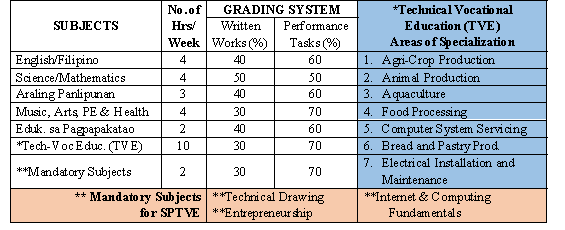
SENIOR HS CURRICULUM OFFERINGS with subjects, Grading System & Time Allotment

IV Recognition and Community
RNAFS’special recognition and student engagements, and extra-curricular activities boast of the following:
Students’ involvement and winnings in the Future Farmers of the Philippines (FFP) and Future Agricultural Homemakers and the Philippines (FAHP) during the past years, and in the Students Technologists and Entrepreneurs of the Philippines (STEP) and Bicol Young Technologists and Entrepreneurs (BYTE) for the recent years have established the school as a top contender.
In sports, RNAFSians excel in volleyball girls, sepaktakraw and baseball boys which has brought years of recognition.
In music and arts, RNAFS is home to the Teatro Ragayano, founded in 2015, which has been a venue for learners to enhance their artistic, musical and performance talents and skills.
Most students, including those in ALS, have passed TESDA assessment, making them NC II holders.
The school’s Drum, Xylophone and Majorette Corps, as well as the marching units has been a strong contingent in local and regional competitions, putting RNAFS’ name in the roster of winners.
V Contacts
Persons to get in touch with at RNAFS are the following:
Ana G. Palenzuela, Secondary School Principal II, with mobile phone number 09985473247, and email address ana.palenzuela@deped.gov.ph.
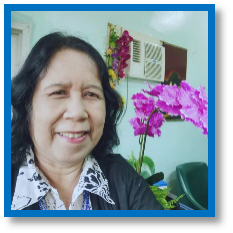
2. Ma. Helen M. Tangente, 09175731915, Head Teacher I/SHS In Charge, with mobile phone number and email address helen.tangente@deped,gov,ph
